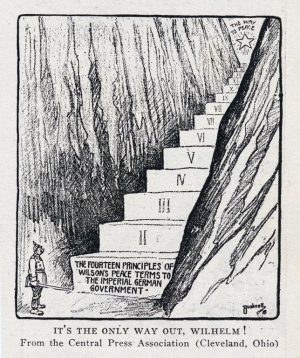President Woodrow Wilson’s Fourteen Points was a speech he gave to the public on January 8th, 1918. The points called for open diplomacy, reduction of arms, freedom of the seas, and general fairness in international dealings in an effort to end World War I as well as prevent future wars. Wilson also urged countries to respect the principle of self-determination. While not all of the Fourteen Points were realized during or after WWI, they have been influential in shaping modern international law and relations.
The Fourteen Points
I. Open covenants of peace, arrived at openly, after which there shall be no private international understandings of any kind, but diplomacy shall proceed always frankly and in the public view.
II. Absolute freedom of navigation upon the seas, outside territorial waters, alike in peace and in war, except as the seas may be closed in whole or in part by international action for the enforcement of international covenants.
III. The removal, so far as possible, of all economic barriers and the establishment of an equal playing field for trade among all the nations consenting to the peace and associating themselves with its maintenance.
IV. Adequate guarantees given and taken that national armaments will be reduced to the lowest point consistent with domestic safety.
V. A free, open-minded, and absolutely impartial adjustment of all colonial claims, based upon a strict observance of the principle that in determining all such questions of sovereignty the interests of the populations concerned must be given equal weight with the equitable government whose title is to be determined.
VI. The evacuation of all Russian territory and such a settlement of all questions affecting Russia will secure the best and freest cooperation of the other nations of the world in obtaining for her an unhampered and unembarrassed opportunity for the independent determination of her own political development and national policy and assure her of a sincere welcome into the society of free nations under institutions of her own choosing; and, more than a welcome, assistance also of every kind that she may need and may herself desire. The treatment accorded Russia by her sister nations in the months to come will be the acid test of their goodwill, of their comprehension of her needs as distinguished from their own interests, and of their intelligent and unselfish sympathy.
VII. Belgium must be evacuated and restored, without any attempt to limit the sovereignty which she enjoys in common with all other free nations. No other single act will serve to restore confidence among the nations in the laws they have set and determined for the government of their relations with one another. Without this healing act, the whole structure and validity of international law are forever impaired.
VIII. All French territory should be freed, the invaded portions restored, and the wrong done to France by Prussia in 1871 in the matter of Alsace-Lorraine, which has unsettled the peace of the world for nearly fifty years, should be righted, in order that peace may once more be made secure in the interest of all.
IX. A readjustment of the frontiers of Italy should be effected along clearly recognizable lines of nationality.
X. The people of Austria-Hungary, whose place among the nations we wish to see safeguarded and assured, should be accorded the freest opportunity to autonomous development.
XI. Romania, Serbia, and Montenegro should be evacuated; occupied territories restored; Serbia accorded free and secure access to the sea; the relations of the several Balkan states to one another determined by friendly counsel along historically established lines of allegiance and nationality; and international guarantees of the political and economic independence and territorial integrity of the several Balkan states should be entered into.
XII. The Turkish portion of the present Ottoman Empire should be assured a secure sovereignty, but the other nationalities which are now under the Ottoman rule should be assured an undoubted security of life and an absolutely unmolested opportunity for autonomous development, and the Dardanelles should be permanently opened as a free passage to the ships and commerce of all nations under international guarantees.
XIII. An independent Polish state should be erected which should include the territories inhabited by indisputably Polish populations, which should be assured free and secure access to the sea, and whose political and economic independence and territorial integrity should be guaranteed by international covenant.
XIV. A general association of nations must be formed under specific covenants for the purpose of affording mutual guarantees of political independence and territorial integrity to great and small states alike.
Summary
Points 1-8 dealt with European problems, including the need for evacuated Russian territory, a settlement of questions affecting Russia, and restoration of Belgium. The purpose was to resolve territorial issues and secure borders.
Points 9-13 focused on self-determination, for nations to govern themselves without outside interference. These points talk about free trade, freedom of the seas, and disarmament.
Point 14 was about creating an association of nations that would help preserve the independence and territorial integrity. This was seen as a way to prevent future wars and had a big impact on the Treaty of Versailles, the peace agreement signed by the Allied Powers and Germany at the end of World War I.
President Wilson hoped to create a peaceful and stable world through his fourteen points. Though not all of his points were realized, they helped to set the stage for the League of Nations. Ironically, America never joined the League, but Wilson’s fourteen points did have a lasting impact on international relations and laid the groundwork for the creation of the United Nations.
